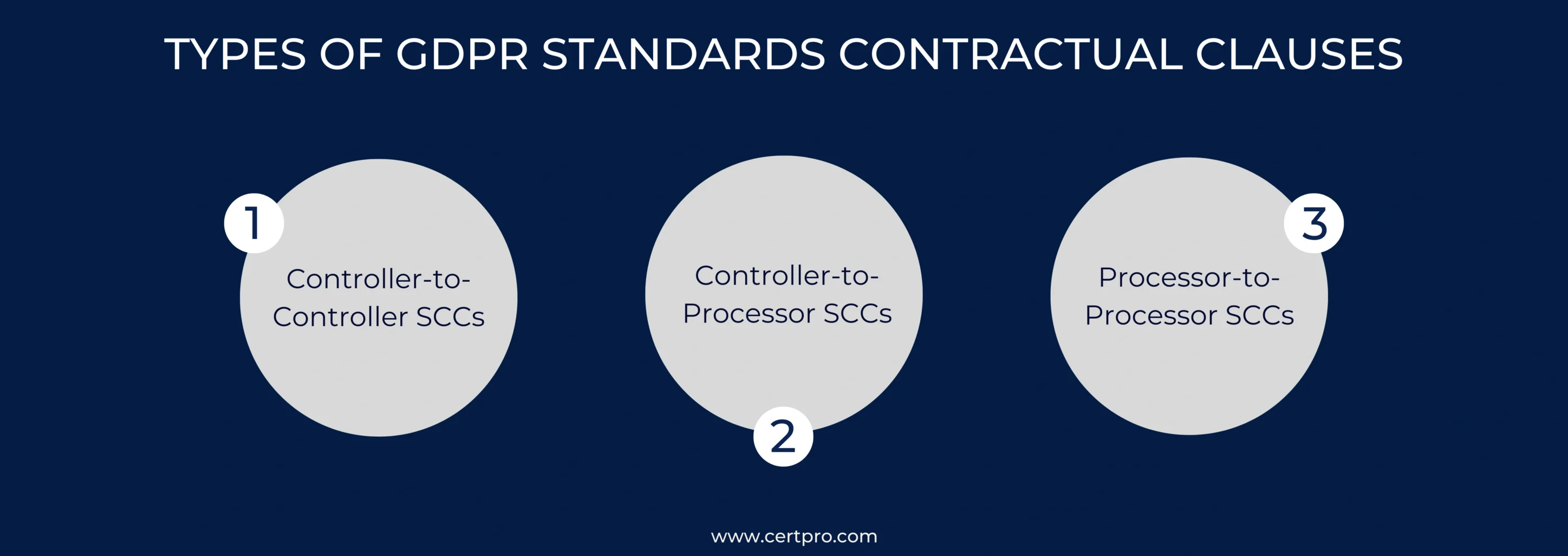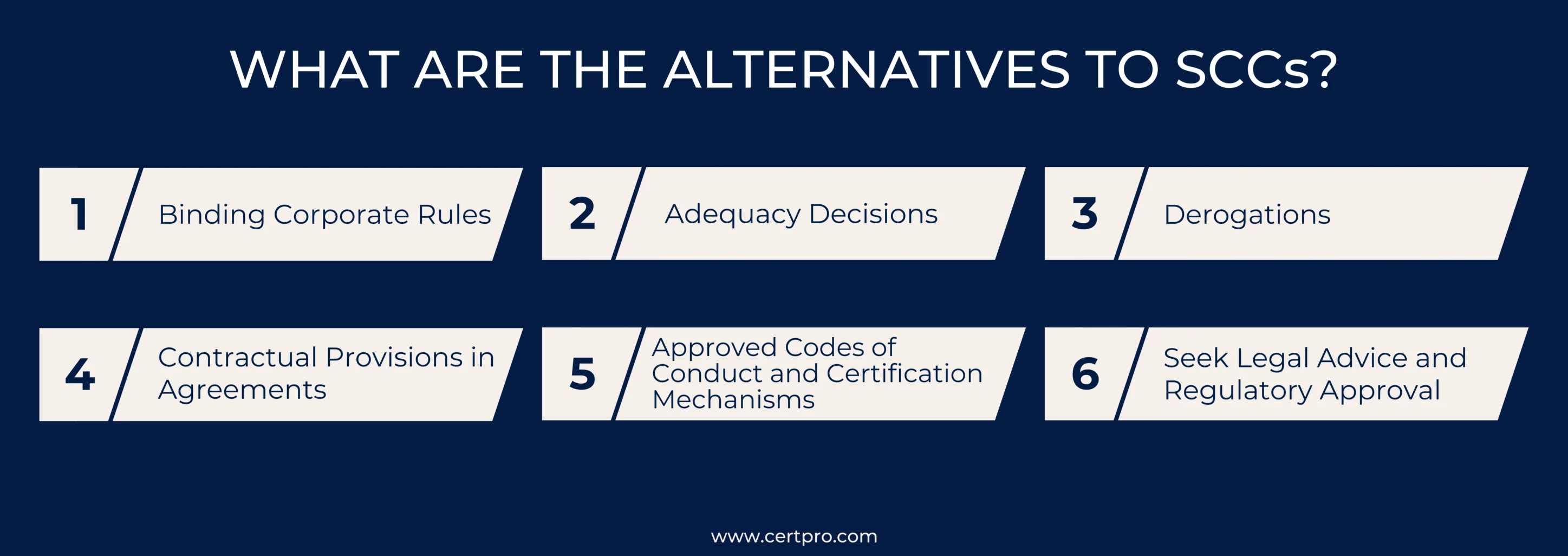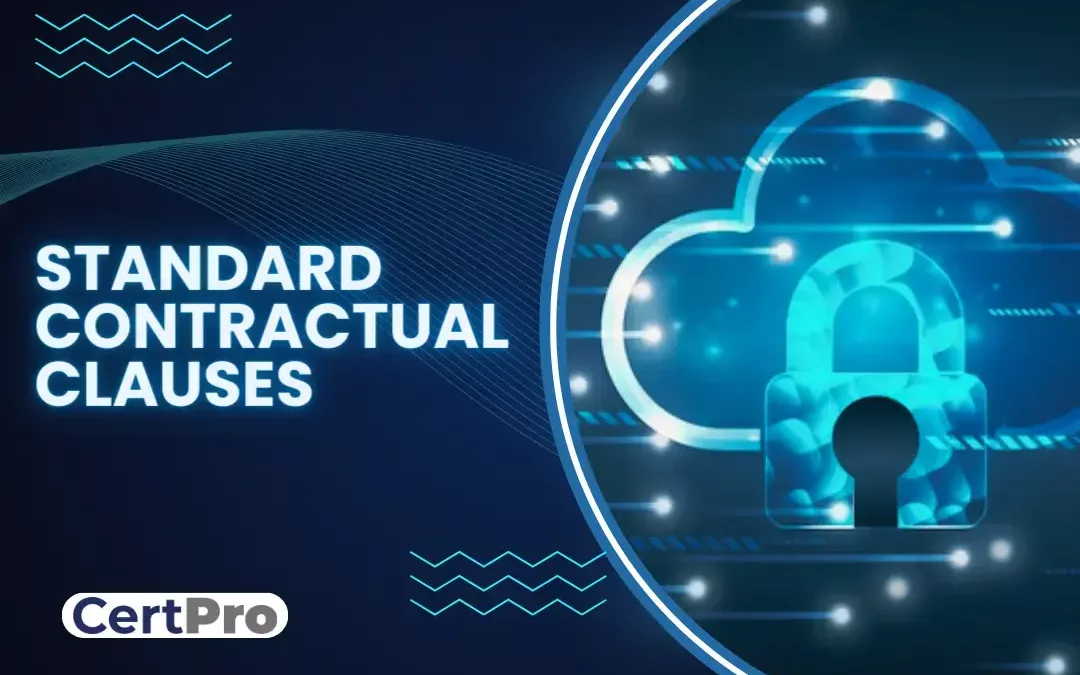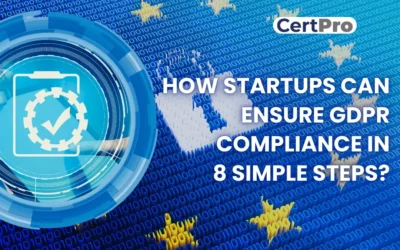In our interconnected digital world, the global transfer of personal data is vital for businesses, organizations, and individuals. However, this data exchange raises concerns about data privacy and protection, especially when data crosses international borders. To address these challenges, Standard Contractual Clauses (SCCs) have emerged as a fundamental legal tool.
SCCs originated as a response to the European Union’s Data Protection Directive of 1995. They are standardized contractual templates designed to ensure that data transfers to countries outside the EU’s standard contractual clauses adhere to EU-level data protection standards under GDPR. SCCs provide a framework that outlines the obligations and responsibilities of both data exporters and importers, offering essential safeguards for individuals’ data privacy rights.
The significance of SCCs lies in their ability to strike a balance between facilitating data flows and upholding data protection principles. By using SCCs, organizations can navigate the complexities of cross-border data transfers while ensuring that data subjects’ rights are respected. This article delves into the origins, significance, challenges, and evolution of SCCs in a world grappling with the complexities of data protection and cross-border data transfers.
WHAT ARE STANDARD CONTRACTUAL CLAUSES?
Standard Contractual Clauses (SCCs), alternatively termed model clauses or model contracts, stand as standardized legal templates or contractual frameworks that streamline the transfer of personal data across different countries or jurisdictions. They serve as a pivotal mechanism to ensure the alignment of international data transfers with data protection regulations, especially when moving data from nations with stringent data protection laws (like the European Union) to those with comparatively less robust data protection measures.
These clauses delineate the rights and obligations of both the data exporter (the entity dispatching the data) and the data importer (the entity receiving the data), guaranteeing the establishment of adequate safeguards for data protection and privacy throughout the entirety of the data transfer process.
The primary objective of SCCs involves ensuring that personal data conveyed to a jurisdiction lacking equivalent data protection laws still benefits from a level of safeguarding that mirrors the data protection standard clauses of the GDPR in the originating jurisdiction. Encompassing elements such as data security, data subject rights, liability, and conformity with pertinent laws, SCCs address diverse facets.
Widely embraced to meet requisites like the European Union’s SCC GDPR, SCCs come into play when relocating data from the EU’s standardized contractual clauses to countries beyond the EU lacking a deemed adequate level of data protection. Organizations find in SCCs a pragmatic avenue to partake in cross-border data transfers while upholding the tenets of privacy and data protection regulations.
TYPES OF GDPR STANDARDS CONTRACTUAL CLAUSES
The General Data Protection Regulation (GDPR) encompasses various categories of Standard Contractual Clauses (SCCs), which organizations can employ to establish the legitimate transfer of personal data from the European Economic Area (EEA) to nations outside the EEA lacking a recognized sufficient level of data protection.
Currently, there are three main types of SCCs:
1. Controller-to-Controller SCCs: These SCCs are used when a data controller in the EEA transfers personal data to another data controller in a third country. They outline the responsibilities and obligations of both the data exporter and the data importer to ensure that data subjects’ rights are protected.
2. Controller-to-Processor SCCs: These SCCs are used when a data controller in the EEA transfers personal data to a data processor (a third-party entity processing data on behalf of the controller) in a third country. They establish the terms and conditions under which the data processor can process the data and ensure that appropriate data protection measures are in place.
3. Processor-to-Processor SCCs: These SCCs are used when a data processor in the EEA subcontracts data processing activities to another data processor in a third country. They extend data protection obligations from the original data controller and data processor to the second data processor, ensuring that data subjects’ rights are maintained.
It’s important to note that these SCCs are not a one-size-fits-all solution; they serve as a foundation that organizations can build upon to address specific data transfer needs and incorporate additional safeguards if necessary. The SCCs are designed to be flexible while providing a standardized framework to ensure compliance with SCC GDPR requirements when transferring personal data internationally.

WHEN DO WE NEED TO IMPLEMENT SCCs?
You need to implement EU Standard Contractual Clauses when you are transferring personal data from the European Economic Area (EEA) to a country outside the EEA that is not deemed to have proper data protection.
Some scenarios when you need to implement SCCs:
1. International Data Transfers: If your organization is based in the EEA and you are transferring personal data to a non-EEA country for processing or storage purposes, you generally need to have legal safeguards in place.
2. Data Controller to Data Processor Transfers: If your organization is a data controller in the EEA and you are engaging a data processor located in a non-EEA country, SCCs might be required.
3. Data Processor to Subprocessor Transfers: If your organization, as a data processor in the EEA, is subcontracting data processing activities to a subprocessor located outside the EEA, SCCs may be necessary to extend data protection obligations to the subprocessor.
4. Outsourcing Services to a Third Country: When outsourcing services that involve the processing of personal data to a service provider in a non-EEA country, SCCs can be used to maintain data protection standards during the outsourcing arrangement.
5. Cloud Services and Data Storage: If you are using cloud service providers or data storage facilities located outside the EEA to store or process personal data, SCCs might be required to ensure that the data remains protected according to SCC GDPR requirements.
6. Cross-Border Employee Data Transfers: When transferring the personal data of employees from an EEA location to a non-EEA branch or subsidiary, SCCs can be used to ensure that employees’ data protection rights are upheld.
Before implementing SCCs, you should carefully assess your data transfer scenario, understand the data protection laws of the recipient country, and evaluate the appropriate safeguards needed to protect the transferred data.
WHAT ARE THE ALTERNATIVES TO SCCs?
There are several alternative mechanisms and strategies that organizations can consider for legally transferring personal data from the European Economic Area (EEA) to countries outside the EEA that are not assessed to have an appropriate level of data protection. These alternatives provide flexibility in addressing the challenges of cross-border data transfers while ensuring data protection compliance.
The other safeguards are as follows:
1. Binding Corporate Rules (BCRs): These are internal rules of conduct that multinational corporations have created to manage the transfer of personal data within their corporate group.
2. Adequacy Decisions: If the European Commission has issued an adequacy decision for the specific country where the data is being transferred, no further mechanisms are necessary.
3. Derogations (Exceptions): SCC GDPR includes specific derogations that allow for data transfers without additional safeguards in certain situations. These derogations include situations where the data subject has given explicit consent and the transfer is necessary for the performance of a contract.
4. Contractual Provisions in Agreements: Apart from SCCs, organizations can negotiate specific contractual provisions directly with the data importer to ensure data protection compliance.
5. Approved Codes of Conduct and Certification Mechanisms: GDPR allows for the establishment of codes of conduct and certification mechanisms that provide appropriate safeguards for international data transfers.
6. Seek Legal Advice and Regulatory Approval: In some cases, organizations might need to seek legal advice or obtain approval from data protection authorities for specific data transfers that do not fall under the usual mechanisms.
It’s important to note that each alternative has its own advantages, challenges, and legal requirements. Organizations should carefully assess their specific data transfer scenarios, consult legal experts, and consider the most appropriate mechanism that aligns with their data protection needs and compliance obligations.

FAQ
HOW DOES SCCS WORK?
SCCs establish contractual obligations and responsibilities for both data exporters and importers. They outline data protection measures, the rights of data subjects, and mechanisms for addressing potential breaches, ensuring data privacy is upheld across borders.
WHAT ARE THE TYPES OF SCCS IN GDPR?
There are three main types of SCCs under the General Data Protection Regulation (GDPR): Controller-to-Controller SCCs, Controller-to-Processor SCCs, and Processor-to-Processor SCCs.
HOW HAS SCCS EVOLVED OVER TIME?
SCCs have evolved to address changes in data protection regulations and court rulings, such as the Schrems II decision. The European Commission introduced updated SCCs in 2021 to align with modern data protection challenges.
HOW SHOULD ORGANIZATIONS IMPLEMENT UPDATED SCCS?
Organizations should assess their data transfer agreements, update contracts to incorporate the new SCCs, and ensure compliance by the specified deadlines.
CAN SCC GDPR BE USED FOR ALL DATA TRANSFER SCENARIOS?
SCCs provide a foundation for data protection, but their applicability depends on the specific data transfer scenario and the relationship between the data exporter and importer.

About the Author
NICOLENE KRUGER
Nicolene Kruger, Regional Manager in South Africa, is an experienced Legal Counsel with expertise in compliance and auditing. Her strategic, solution-driven approach aligns legal standards with business objectives, ensuring seamless adherence to regulations.
HOW STARTUPS CAN ENSURE GDPR COMPLIANCE IN 8 SIMPLE STEPS?
General Data Protection Regulation is a highly influential data privacy regulation worldwide. It has extraterritorial implications for businesses worldwide that process the personal data of EU residents. Startups are enthusiastic about scaling while maintaining trust...
AI and GDPR: How Artificial Intelligence Can Ensure Data Protection?
The European Union’s General Data Protection Regulation offers a legal data protection and privacy framework. As Artificial Intelligence continues to expand across industries in modern technology, the concept of AI and GDPR becomes relevant. In 1950, researchers...
HOW TO CONDUCT A GDPR AUDIT FOR MY BUSINESS?
The General Data Protection Regulation (GDPR) is vital for today's digital landscape. It is a cornerstone for safeguarding people's privacy rights in the European Union (EU). Therefore, organizations dealing with EU residents' data must follow these GDPR rules....




